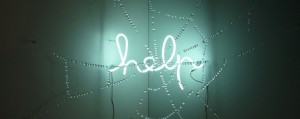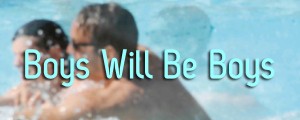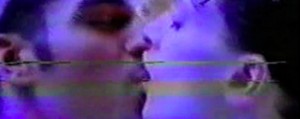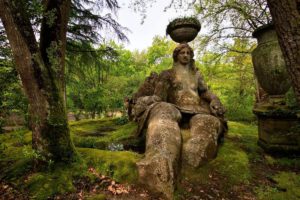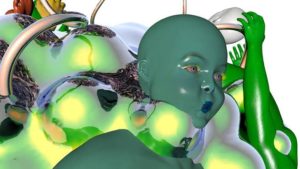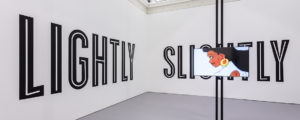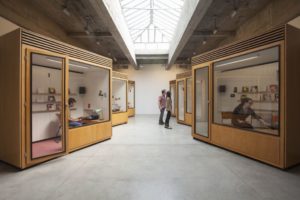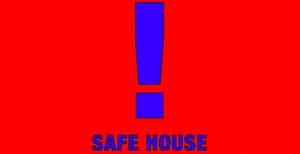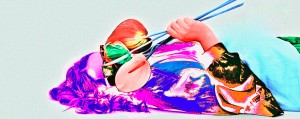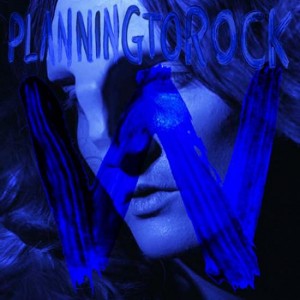Janine Rostron (aka planningtorock) is somewhat of an anomaly. Originally from the small town of Bolton, Manchester, she bypassed the obvious choice of carving out a career in London, and headed to the creative freedom and relative obscurity of life in Berlin. She’s come out a decade later, with her label Rostron Records, two albums and a profile-boosting collaboration with The Knife and Mt Sims last year. Now, sitting at a bench in London’s east, she’s back in her homeland to promote the follow-up to her 2006 album ‘Have It All’, enigmatically titled ‘W’. Here, she moves on from exploring the life of an expat in songs like ‘Local Foreigner’ and ‘Bolton Wanderer’ in her debut, to investigating sexuality and gender in this day and age.
aqnb: You’ve mentioned before how freeing it can be to be living as a foreigner in another country. When you first left England was that what you were searching for?
JR: No, it wasn’t clear. I think sometimes in your life there are things that make you move around, you find yourself in a place and then you’re like, ‘alright, okay’ and that’s what happened with Berlin. I had no intention of leaving England. It didn’t even occur to me. In Berlin, I just got this distance from everything else and was able to have the space to delve into what I was interested in.
aqnb: I automatically assumed that you were German because of the way you make music, especially considering their history with electronica. Is that what drew you there in the first place?
JR: Again, no [laughs]. Nothing has ever drawn me musically because I’ve never really been a part of a scene, a musical scene. To be honest, my liking of music has been pretty independent and a little bit out of sync with whatever else I’ve felt is happening. But one thing I would say is that I like how music happens in Berlin. It works on it’s own terms and, even though certain scenes have happened, it feels very independent of everything else. It has it’s own time frame. There are people I know that have lived in Berlin for a long time and have been making music for long time and it comes up and it comes down. It’s very unique.
aqnb: You can see any band you want in the world there. You don’t have to worry that it’s going to sell out and you don’t have to worry that you’re going to be waiting in line…
JR: It’s true. There are so many factors about Berlin. People do go out an awful lot and follow music quite hardcore. At the moment, there are some interesting noise scenes happening but they just bubble away and there’s no hype about it. There are just people doing their thing with quite a fanatical audience and it’s just really creative. It’s a very creative city.
aqnb: I can see how you could be drawn there. It’s got this very communal attitude. I haven’t really seen much of the rest of Germany but it seems quite autonomous. You can’t buy Coca Cola in every single store.
JR: Yeah, it’s weirdly backwards in a lot of ways. It was a really anti-American culture for a long time. I have a lot of German friends who say they grew up without TV and they were very careful about what permeated their culture in a way. That’s another thing I like about Berlin as well, it isn’t that consumerist at all. It’s not just that people don’t have money, it’s almost like they’re not as materialistic somehow. People just don’t care so much.
aqnb: Do you think that as a visual artist, as well as a musician, that your own sacrifices and aversion to ‘having things’ can be typical to an artist?
JR:Music is a virtual medium and that’s the amazing thing about it. It isn’t a thing you have to carry around with you and I really like that about it. I’m very much an ideas person and a lot of it is in my head, my brain and my thoughts, while putting that in the music and spending time with the music. I go through periods of working with a lot of gear and other times I’m not. I can make music any way I want, that’s the beautiful thing about it. Also, with video especially, it’s a digital medium, so the material aspect of it, the object, is quite pared down and that suits me too.
aqnb: Your multimedia approach to your work, it looks like you’ve been doing it for as long as you’ve had a career, or a practice. Nowadays, it’s almost the status quo of younger musicians. They do their own music videos on iMovie, catering to a format of 700 pixels for YouTube, and they don’t even think about things like television.
JR: The thing is, when I first started doing it, everybody had a hard time accepting it. They’d ask, ‘are you a musician or are you an artist? We’re unhappy to accept that you could do both.’ So it was a fight for a long time. Also, it was making a live performance that was attempting to create this third language. I love when performance, visual and music come together. These days it’s fantastic. I love the speediness of being able to be really spontaneous. To make something and put it out there independently. It’s also great for your creative language, that speed.

aqnb: Like the face putty thing.
JR: It’s funny. I didn’t want to wear helmets anymore like I did for the first album, which was also what performing was for me. Wearing helmets was not a hiding but an expansion, an adding on. I had this idea of adding on or extending to my features. So, I literally just bought this face putty and put it on. I discovered that when certain features are added or removed, things happen.
aqnb: This machismo, or gender-bending thing you’re exploring –when you discovered that the way you transformed your face made you look more masculine or feminine –how does that fit into your overall concept?
JR: The putty thing was trying to make visual what I’d created in the music, how I feel sexually or with gender. I’m always interested in expanding, not only on what we’ve got, but exploring what else there is. Trying to represent details and discovering there’s more to it, while also being really playful with it.
To be honest, I’m really interested in female sexuality. That’s for myself and how I feel and I put that out in my creativity. The most important and amazing thing for me, why I make music, is basically because I learn a lot from it. It’s how I get to understand shit [laughs]. I can work a lot of stuff out and make a lot of discoveries.
I also feel like male sexuality, both straight and gay, has been really fully explored and I’m really curious about female sexuality; beyond ‘butch’, or not butch or whatever. I’m not dissing that, it’s brilliant, but what else is there? There’s definitely more. I feel there’s more.

aqnb: With this generation, you realise that it’s not just about the male/female dichotomy anymore. Today, you’ll read someone like Germaine Greer and realise that she’s already a bit dated. She makes a very strong distinction between the two genders and it’s not that straight forward.
JR: No, and that’s a fantastic thing to discover. You realise that and then you find a way that you can represent that and use that creatively. That’s really fun. Then people all of a sudden really relate to it and I’ve been amazed by the reaction I’ve got, especially from women.
aqnb: You say you use your music to explore ideas. Do you think it’s not so much a statement but a process?
JR: Discoveries always have certain points where something comes together and maybe there’s some sort of statement out of that but it’s an ongoing process for me. It’s like an eternal experiment.
aqnb: You say you’ll write and record the music but then the performance will give the work a new level of meaning. When I read that, I thought of surreal automatism. Where you’ll write something down unconsciously but it develops it’s own symbolism after the fact.
JR: If you write lyrics and then you attach a human to it, it has a very different meaning then. I mean, you can hear it but then when that person is expressing that lyric, something else happens. I love that part. It’s almost like the words suddenly achieve their full meaning. It’s as if the lyrics are ahead of me, I catch them up with performance and other things happen.
aqnb: So something like pitching down your vocals: ‘what would I be as a man’?
JR: Pitching down for me isn’t, ‘what would I be like as a man’, it’s just pure sonics. I don’t genderise the vocal at all. For me, it’s an instrument and that sound communicates a particular emotion that fitted songs like ‘Doorway’ and ‘The One’. It isn’t about male or female, it’s more about an emotion being expressed through that instrument being the voice.
aqnb: “Exploring your own sexuality is something important to you”. Do you feel like that’s something you’ve been working towards in your career?
JR: I think it just has come out through a very genuine personal interest. I’m a woman living around and I’m interested in how I interact and how people react to me in different cultures, with different ideas of what femininity is and all the rest. It’s about how I deal with that on a personal level and it comes out in my work. On the other hand the music is very much apart from all those topics. I’m mad about certain instruments and sounds, certain arrangements and things that I’m just exploring on a musical level.
aqnb: People seem surprised that you should say there’s a strong sense of humour in these heavy beats etcetera. I feel like the best art is always subversive and it always has a sense of humour, no matter how morose it may seem.
JR: The reactions to some of the songs being dark really surprised me. I make a differentiation between heavy and dark. ‘Heavy’ means it’s loaded with something and it doesn’t necessarily mean it’s dark matter. It’s actually just got a lot of content. I think that’s more what I would say and it’s saying quite a lot on all these different levels.
I‘m dead serious about what I’m doing, dead serious, but I never take myself too seriously because it’s just music [laughs]. I find it really funny and it’s a fantastic vehicle for humour. Even when I’m performing, some of things I do, there is bloody humour in it.

aqnb: If you took something too seriously then you’d be earnest and that’s not necessarily a good thing either.
JR: No, it’s also patronising. I really admire PJ Harvey’s new record for example. She’s trying to make a record about such a fucking difficult subject and not be patronising, or worthy, or righteous. It’s very hard to do. It’s the same about sexuality, or gender, or music in general. That’s the great thing about music though, without the lyrics it’s just a fantastic language that can say a lot without anybody knowing immediately what you’re saying.
aqnb: I really like ‘I Am Your Man’, it makes me think about how you mentioned that male sexuality and gay male sexuality has been explored so deeply. I feel the same about writing. All the iconic writers now are Dave Eggers, Jonathan Franzen, Jonathan Safran Foer. I don’t really care what these guys have to say any more. I’ve been listening for thousands of years. It’s those marginal voices that are far more interesting.
JR: Totally. I think it’s a really exciting time. I have to say I’m overwhelmed by the reaction to the record. I love it and it’s my thing but I had no idea of the reaction it would get and it seems to me like people right now are really hungry for details, for something else. It’s something that’s got a lot of content and they’re not put off by it. I find that really exciting.
I also know exactly what you mean. That point when you get to some writers or even some musicians and you’re just like, ‘I’m just fucking bored. Really, I’m so over that. I really want something else’. I think it’s at that point, when you’re like, ‘I want something else and what is that?’ I was at that point with my music, my performance and with who I am. I want something else.
aqnb: So What Women Want? Is that the ‘W’ of the album?
JR: It’s whatever you want it to be. It was really hard to think of something and I was always saying too much or too little. But I’ve always liked ‘w’, it’s like, ‘double you’. I like symmetry and doppelgangers and all that. I thought it was hilarious that everybody just thought that I was saying ‘woman’, or ‘war’ of ‘why’; all the cheesy things. That’s when I thought, ‘well, go for the cheese and go for this fantastic letter that can be interpreted in so many ways’.
I just love the freedom of it. I think as a record, now that I’ve had a bit of distance, it’s like this thing that you can see it’s created together but it’s quite a mixture of stuff. So that should then mean that people choose, ‘what’ it means to them.
aqnb: Like ‘whatever’.
JR: ‘Whatever’, yeah! **
Planningtorock’s W is out now on DFA.
